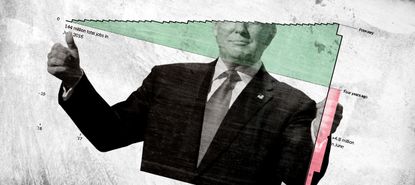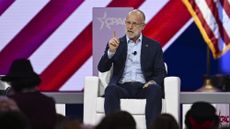Republicans have found their excuse to leave Americans in the lurch
The June employment report had some good news. But America is still headed for disaster.


The June jobs report is out, and Republicans are again declaring victory. Payrolls grew by 4.8 million in June, according to government surveys, and the official unemployment rate fell to "only" 11.1 percent. "HISTORIC JOBS NUMBERS!" President Trump tweeted. The Washington Post's Jeff Stein reports that in response, Republicans are starting to coalesce around a second round of economic rescue payments that include a sharply smaller super-unemployment benefit (with a boost of $200-300 instead of $600), and a smaller round of more strictly means-tested checks — though Treasury Secretary Steven Mnuchin told reporters he was not yet ready to support the latter.
All else equal, it is good that people are getting jobs. But there are strong reasons to think the economy has already stalled out. We will need a great deal more recovery to get through the pandemic, but Republicans are clearly itching for any excuse to leave Americans twisting in the wind.
To begin with, there is quite a lot of bad news under the hood of this report, even on jobs. Normal unemployment is calculated as the fraction of workers who are looking for work but can't find it, for any reason. People who aren't looking for jobs are considered to have left the labor force and are left out. Economist Jed Kolko calculates a "core" unemployment rate as the number of permanent layoffs or quits (thus ignoring temporary ones) and includes the "marginally attached" people who say they would like a job but have not tried to look for one over the past four weeks. This kind of unemployment has increased steadily since February, and accelerated in June from 5.0 percent to 5.9 percent.
Subscribe to The Week
Escape your echo chamber. Get the facts behind the news, plus analysis from multiple perspectives.

Sign up for The Week's Free Newsletters
From our morning news briefing to a weekly Good News Newsletter, get the best of The Week delivered directly to your inbox.
From our morning news briefing to a weekly Good News Newsletter, get the best of The Week delivered directly to your inbox.
In other words, the increase in jobs over the last month is entirely about temporary layoffs being reversed. Again, that's a good thing, but we are still almost 15 million jobs in the hole, and there is a serious and increasing problem of permanent unemployment as recessionary effects take hold and businesses shrink or close.
Probably more importantly, the June numbers are already out of date. The surveys are collected during the first two weeks of the month, so they will necessarily miss things happening during the later weeks. That's fine in normal times, but the last two weeks have seen an enormous surge in coronavirus cases across the country, and as Greg Ip writes at the Wall Street Journal, private economic activity indexes have shown a stalling out of spending across the country over that period. In states with bad outbreaks like Texas and Florida, it is going into reverse. Weekly unemployment claims have also started going sideways over the last month or so, at levels many times the worst seen during the Great Recession.
It's a safe bet that on our current track even the restoration of temporary layoffs is going to slow down drastically or even reverse over the coming months, and the economy will stop far short of where it was in February.
What America needs now is the same thing it needed back in March: government money stuffed into citizens' pockets. The huge boost to unemployment benefits, the small business grants, and the one-off rescue payment are all that is keeping tens of millions of people from starving — even with that a lot of people still don't have enough to eat. But the rescue payment is long since spent, the small business loan program has expired (at least for the moment), and super-unemployment will do so at the end of July. It is lunacy to consider turning down these programs at this point. Without further major rescues — something a lot bigger than what Republicans are considering — the economic situation will worsen, and we might even see bread riots.
All this is blisteringly obvious and has been for months. Republicans whine that super-unemployment pays lower-income workers more not to work, but there aren't enough jobs to go around, and in any case we don't want people going to work during a pandemic if we can help it. Since the Trump administration has not even tried to control the virus, and many states have sprinted headlong into the pandemic brick wall, the money taps must remain open until either we have a vaccine, herd immunity, or a new president (if it turns out Biden can do the job). And as I've argued before, the U.S. government can borrow without limit so long as the economy has not recovered.
Once the pandemic has passed, we can think about ways to restore employment and production. It would even be easy to address conservative complaints about labor incentives: simply make the universal checks bigger to compensate. That way lower-income people would be getting the money they desperately need, but still would be ahead on net if they took a job.
But Republicans plainly are not concerned with mere labor incentives. Handing out money to the poor is morally offensive to them. They consider the main duty of the state as shoving people out into the labor market so they have no choice but to work making profits for the business class. Whether that is sensible or even possible is a secondary consideration at best. President Trump's re-election campaign may be a casualty of this idée fixe, and if so, he will deserve to lose.
Sign up for Today's Best Articles in your inbox
A free daily email with the biggest news stories of the day – and the best features from TheWeek.com
Ryan Cooper is a national correspondent at TheWeek.com. His work has appeared in the Washington Monthly, The New Republic, and the Washington Post.
-
 The Great Mughals: a 'treasure trove' of an exhibition
The Great Mughals: a 'treasure trove' of an exhibitionThe Week Recommends The V&A's new show is 'spell-binding'
By The Week UK Published
-
 Damian Barr shares his favourite books
Damian Barr shares his favourite booksThe Week Recommends The writer and broadcaster picks works by Alice Walker, Elif Shafak and others
By The Week UK Published
-
 Big Tech critic Brendan Carr is Trump's FCC pick
Big Tech critic Brendan Carr is Trump's FCC pickIn the Spotlight The next FCC commissioner wants to end content moderation practices on social media sites
By David Faris Published
-
 US election: who the billionaires are backing
US election: who the billionaires are backingThe Explainer More have endorsed Kamala Harris than Donald Trump, but among the 'ultra-rich' the split is more even
By Harriet Marsden, The Week UK Published
-
 US election: where things stand with one week to go
US election: where things stand with one week to goThe Explainer Harris' lead in the polls has been narrowing in Trump's favour, but her campaign remains 'cautiously optimistic'
By Harriet Marsden, The Week UK Published
-
 Is Trump okay?
Is Trump okay?Today's Big Question Former president's mental fitness and alleged cognitive decline firmly back in the spotlight after 'bizarre' town hall event
By Harriet Marsden, The Week UK Published
-
 The life and times of Kamala Harris
The life and times of Kamala HarrisThe Explainer The vice-president is narrowly leading the race to become the next US president. How did she get to where she is now?
By The Week UK Published
-
 Will 'weirdly civil' VP debate move dial in US election?
Will 'weirdly civil' VP debate move dial in US election?Today's Big Question 'Diametrically opposed' candidates showed 'a lot of commonality' on some issues, but offered competing visions for America's future and democracy
By Harriet Marsden, The Week UK Published
-
 1 of 6 'Trump Train' drivers liable in Biden bus blockade
1 of 6 'Trump Train' drivers liable in Biden bus blockadeSpeed Read Only one of the accused was found liable in the case concerning the deliberate slowing of a 2020 Biden campaign bus
By Peter Weber, The Week US Published
-
 How could J.D. Vance impact the special relationship?
How could J.D. Vance impact the special relationship?Today's Big Question Trump's hawkish pick for VP said UK is the first 'truly Islamist country' with a nuclear weapon
By Harriet Marsden, The Week UK Published
-
 Biden, Trump urge calm after assassination attempt
Biden, Trump urge calm after assassination attemptSpeed Reads A 20-year-old gunman grazed Trump's ear and fatally shot a rally attendee on Saturday
By Peter Weber, The Week US Published